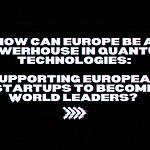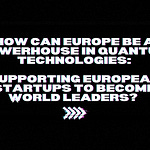“Europe Can Win in Applied AI — If We Play to Our Strengths”
In one of the most focused and forward-looking sessions of the summit, Juliet Bailin of General Catalyst made a compelling case for why Europe is uniquely positioned to lead in applied AI—not by copying Silicon Valley, but by doubling down on what makes the continent distinct.
Why Europe? Because We're Built for It
Juliet opened with a reminder of Europe’s superpowers:
Regulatory complexity,
Cultural and linguistic diversity, and
Strong traditions in research and privacy.
These aren’t weaknesses—they’re strategic advantages for human-centric, domain-specific, and trust-first AI.
“Highly regulated industries are perfect for specialized AI,” Juliet argued. “And cultural diversity is crucial for building human-centric systems.”
Applied AI Is Europe’s Opportunity
Rather than pursuing general-purpose models that require vast compute resources (a game already dominated by US giants), Juliet emphasized applied AI—targeted solutions built into real-world workflows. Europe’s leadership in sectors like healthcare, finance, and mobility offers the perfect foundation.
General Catalyst is backing this with:
Incubation of applied AI startups
AI roll-ups of legacy businesses with strong distribution
Public-private convenings via the General Catalyst Institute
A Call for Innovation-First Policy
Juliet called on governments to do more than fund foundational research:
“We need governments that can incentivize the adoption of European, homegrown applied AI companies.”
That means clear pathways for public procurement, regulation that encourages innovation, and aligned industrial policy.
What Founders Can Do
Her message to entrepreneurs was crisp and actionable:
Build in regulated industries where Europe leads
Prioritize trust-first AI—privacy, explainability, fairness
Join the EU AI Champions Initiative → AIChampions.eu
(A platform to connect startups with the corporates and investors driving Europe's AI future)
From GDP to Legacy
Juliet closed with a powerful vision—not just of returns or GDP growth, but of rewriting the social and economic history of Europe:
“If we do this right… future historians will talk about it at the next EUVC summit.”









